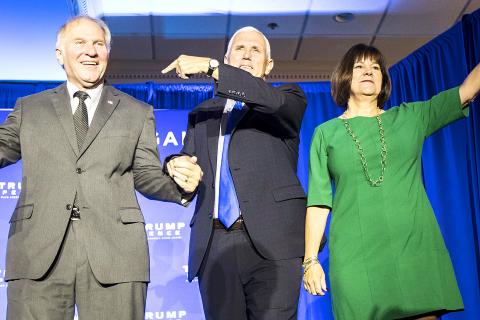A bill that seeks to encourage visits between Taiwan and the US at all levels was on Thursday passed by a US House of Representatives subcommittee in the first step toward its legislation.
The US House of Representatives Foreign Affairs Subcommittee on Asia and the Pacific unanimously passed the Taiwan travel act bill, which was initiated by US Representative Steve Chabot, and cosponsored by US representatives Brad Sherman and Ed Royce, chairman of the US House Committee on Foreign Affairs.
“The United States government should encourage visits between the United States and Taiwan at all levels,” the bill states.

Photo: AP
It says that since the enactment of the Taiwan Relations Act (TRA) in 1979, ties between Taiwan and the US have suffered from insufficient high-level communication due to the self-imposed restrictions that the US maintains on visits by high-ranking officials.
The bill, which seeks to eliminate the restrictions, is to be sent to the US House Committe on Foreign Affairs for approval.
A similar bill with the same title was also introduced to the US Senate. It was initiated by Republican senators Marco Rubio, Jim Inhofe and Cory Gardner; and Democratic senators Sherrod Brown, Bob Menendez and Gary Peters.
Before the bill can become law, it must be passed by both the House and Senate, then signed by US President Donald Trump.
President Tsai Ing-wen (蔡英文) yesterday expressed her appreciation to US officials, including US Secretary of State Rex Tillerson, for their support of Taiwan.
“Over past few days, we’ve seen US officials, including SecState Tillerson, speak in support of #TaiwanRelationsAct & Taiwan-US relations,” Tsai tweeted.
Tillerson told a US House committee hearing that while the US remains committed to its “one China” policy, it fully intends to fulfill all commitments to Taiwan under the TRA.
The TRA is a US law under which the US is committed to provide Taiwan with defensive weapons.
Tsai also expressed appreciation for the subcommittee’s unanimous passage of the bill.
“Taiwan appreciates continued support of friends in US, Japan & others, & will continue to work together for peace & stability in region,” Tsai tweeted.
The US allows authoritarian Chinese leaders to visit Washington at any time and gives them a red-carpet welcome, but has shunned democratically elected leaders from its long-term friend Taiwan, Washington-based Formosan Association for Public Affairs (FAPA) president Peter Chen (陳正義) said in a news release.
Only Washington, not Beijing, has the right to decide who can visit the US, Chen said.
With relatively new governments in office in Taiwan and the US, it is an opportune time to change the rules on visits by Taiwanese officials, he said.

AGING: As of last month, people aged 65 or older accounted for 20.06 percent of the total population and the number of couples who got married fell by 18,685 from 2024 Taiwan has surpassed South Korea as the country least willing to have children, with an annual crude birthrate of 4.62 per 1,000 people, Ministry of the Interior data showed yesterday. The nation was previously ranked the second-lowest country in terms of total fertility rate, or the average number of children a woman has in her lifetime. However, South Korea’s fertility rate began to recover from 2023, with total fertility rate rising from 0.72 and estimated to reach 0.82 to 0.85 by last year, and the crude birthrate projected at 6.7 per 1,000 people. Japan’s crude birthrate was projected to fall below six,

US President Donald Trump in an interview with the New York Times published on Thursday said that “it’s up to” Chinese President Xi Jinping (習近平) what China does on Taiwan, but that he would be “very unhappy” with a change in the “status quo.” “He [Xi] considers it to be a part of China, and that’s up to him what he’s going to be doing, but I’ve expressed to him that I would be very unhappy if he did that, and I don’t think he’ll do that. I hope he doesn’t do that,” Trump said. Trump made the comments in the context

SELF-DEFENSE: Tokyo has accelerated its spending goal and its defense minister said the nation needs to discuss whether it should develop nuclear-powered submarines China is ramping up objections to what it sees as Japan’s desire to acquire nuclear weapons, despite Tokyo’s longstanding renunciation of such arms, deepening another fissure in the two neighbors’ increasingly tense ties. In what appears to be a concerted effort, China’s foreign and defense ministries issued statements on Thursday condemning alleged remilitarism efforts by Tokyo. The remarks came as two of the country’s top think tanks jointly issued a 29-page report framing actions by “right-wing forces” in Japan as posing a “serious threat” to world peace. While that report did not define “right-wing forces,” the Chinese Ministry of Foreign Affairs was

PREPAREDNESS: Given the difficulty of importing ammunition during wartime, the Ministry of National Defense said it would prioritize ‘coproduction’ partnerships A newly formed unit of the Marine Corps tasked with land-based security operations has recently replaced its aging, domestically produced rifles with more advanced, US-made M4A1 rifles, a source said yesterday. The unnamed source familiar with the matter said the First Security Battalion of the Marine Corps’ Air Defense and Base Guard Group has replaced its older T65K2 rifles, which have been in service since the late 1980s, with the newly received M4A1s. The source did not say exactly when the upgrade took place or how many M4A1s were issued to the battalion. The confirmation came after Chinese-language media reported